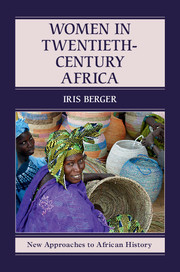Book contents
- Frontmatter
- Dedication
- Contents
- LIST OF ILLUSTRATIONS
- LIST OF MAPS
- PREFACE
- Map
- Introduction
- 1 Colonizing African families
- 2 Confrontation and adaptation
- 3 Domesticity and modernization
- 4 Mothers of nationalism
- 5 The struggle continues
- 6 “Messengers of a new design”: marriage, family, and sexuality
- 7 Women's rights: the second decolonization?
- 8 Empowerment and inequality in a new global age
- Contradictions and challenges
- REFERENCES AND FURTHER READING
- INDEX
3 - Domesticity and modernization
Published online by Cambridge University Press: 05 May 2016
- Frontmatter
- Dedication
- Contents
- LIST OF ILLUSTRATIONS
- LIST OF MAPS
- PREFACE
- Map
- Introduction
- 1 Colonizing African families
- 2 Confrontation and adaptation
- 3 Domesticity and modernization
- 4 Mothers of nationalism
- 5 The struggle continues
- 6 “Messengers of a new design”: marriage, family, and sexuality
- 7 Women's rights: the second decolonization?
- 8 Empowerment and inequality in a new global age
- Contradictions and challenges
- REFERENCES AND FURTHER READING
- INDEX
Summary
In May 1940, a smartly dressed African American woman from Winston-Salem, North Carolina disembarked at Cape Town harbor. The war in Europe had postponed her trip to South Africa and her upcoming marriage to A.B. Xuma, a highly respected physician who was soon to become President of the African National Congress (ANC), the country's main nationalist organization. Well-educated and anxious to contribute her experience to the cause of black progress in her adopted country, Madie Hall Xuma revitalized the ANC Women's League and became its first President. But equally important, she founded a network of women's organizations, the Zenzele (“do it yourself”) clubs. With a strongly domestic focus during the 1940s and a greater emphasis on social service after their affiliation with the international YWCA in the 1950s, these clubs formed the center of Xuma's life in South Africa, creating the legacy most commonly attached to her name.
In an interview in 1963, just before Hall left South Africa after her husband's death, she elaborated on how she perceived domestic skills:
In the past twenty years there has been a wonderful change in African homes, despite the low income. The women can prepare meals and entertain with confidence and they often do so. High teas, morning teas, luncheons etc. are prepared by them and served beautifully. They have also learnt how to dress, with right colour combinations, and how to sit, stand and walk correctly. When buying furniture for their tiny homes, they choose carefully, giving attention to design and colour.
Although the Zenzele clubs conveyed new domestic expertise and ideas about gracious living, Hall stressed the longer-term personal significance of these accomplishments. The clubs, she believed, gave women enhanced confidence and knowledge of how to run an organization and raise funds, and a new collective identity as sophisticated homemakers.
Women's accounts of their activities best convey the meaning of this experience. In 1947, R. Msweli, a founding member, wrote from the Johannesburg neighborhood of Sophiatown about her new level of self-assurance:
The development the Club has roused in me could be the following:- (i) It has improved me socially and mentally (ii) It has removed inferiority complex in my person (iii) It has taught me to work cooperatively (iv) It has enable [sic] me to depend on myself regarding home management.
- Type
- Chapter
- Information
- Women in Twentieth-Century Africa , pp. 45 - 65Publisher: Cambridge University PressPrint publication year: 2016
- 1
- Cited by



